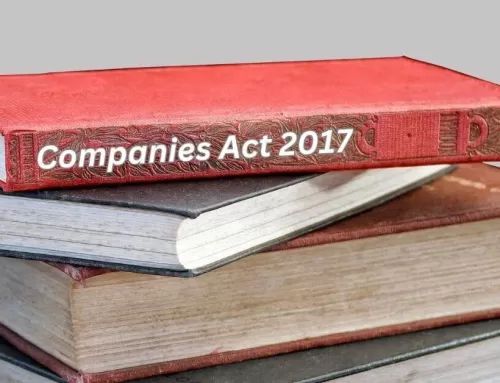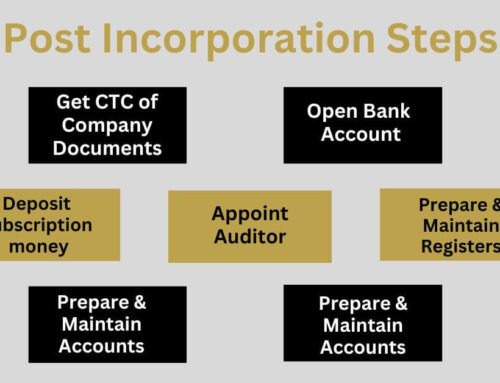Requirements of Company Compliance in Pakistan
Company law in Pakistan (the Companies Act 2017) prescribes legal and regulatory requirements for company compliance in Pakistan. These requirements vary from company to company based on the type of the company or its size. However, the law in Pakistan prescribes certain compliance requirements for all companies.
All companies regardless of their type or size must fulfill certain compliance requirements discussed below.
Overview
Publication of Name by a Company
First of all, the Company law requires every company to display its name and incorporation number at its registered office and all other places where it carries on business like a branch or sub-office. The name and incorporation number must be displayed in a noticeable place and easily readable letters in English or Urdu. In addition, a company must display a certified copy of its certificate of incorporation at every place of business
The law also requires every company to print its name, address of its registered office, telephone number, fax number, e-mail, and website addresses, if any, on letterhead and all its documents, notices, and other official publications.
The requirement of publication of the name, in legible Urdu or English letters also applies to all:
- bills of exchange
- promissory notes
- endorsements
- cheques and orders for money or goods
- all bills of parcels
- invoices
- receipts
- letters of credit
Describe Kinds and Classes of Shares in Articles
The second thing Company law in Pakistan requires is that the articles of association of the company must list and enumerate the voting and other rights. Each respective class or kind of share must mention what rights are attached to each class or kind of share issued or to be issued by the company.
Issue Share Certificate within the Prescribed Time
The Company law in Pakistan mandates every company to issue certificates of shares or other securities within thirty days after the allotment of any of its shares or other securities. The company must also ensure delivery of the certificates to the entitled person at his address registered with the company.
Maintain Register of Members and Index
The law in Pakistan obligates every company to keep a register of its members. In the case of joint holders, the names and other particulars of each joint shareholder must be maintained.
If a company has more than 50 members, it must also maintain an index of members unless the register itself is in the form of an index. Any change in the members must reflect the change in the index within 14 days of the change.
Maintain a Register of Debenture-holders
As for members, the Company law also requires every company to maintain a register of debenture holders, if any, mentioning their names and other necessary particulars. If a company has more than 50 debenture holders, the company must also maintain an index. Any changes in the register must be updated within 14 days.
Maintain Register of Share Transfers
The Company law requires every company to maintain a register of transfers of shares and other securities. The company must maintain this register at its registered office.
The share transfer register must be open for inspection for at least two hours during working hours. A company may not charge any amount for inspection from members. However, the company may charge a reasonable fee from other persons for the inspection.
Any person may apply to the company in writing to request a certified copy of the register of transfers or its index. The company may charge a reasonable fee for providing a copy.
Keep Instruments and Maintain Register of Mortgages and Charges
Next, the law requires every company to keep all the instruments that create a mortgage or charge on the assets of the company at its registered office. The details of each instrument must be maintained in a register. The company must also keep any document evidencing modification of the terms and conditions of the charges or mortgages.
Keep a Record of the Ultimate Beneficial Owners
Since the 2020 amendment to the Companies Act 2017, every company must maintain a register of its ultimate beneficial owners to timely record their accurate particulars updated from time to time. The company must also record any change in particulars or change of beneficial ownership.
Hold AGM Every Year
Another obligation of all companies is to hold annual general meetings. Every company must hold its first annual general meeting within 16 months from the date of incorporation. For the subsequent years, the company must hold its annual general meeting in every calendar year within 120 days after the close of its financial year.
Maintain Record of Resolutions and Meetings of the Company and the Board
For transparency and ensuring the interests of stakeholders, the next requirement under the law is to keep a record of all the resolutions passed at general meetings or otherwise. Every company must also maintain a record of all the proceedings of general meetings along with the names of participants. The company must keep this record at its registered office.
As for general meetings, every company must maintain a record of resolutions passed by the Board of Directors in their meetings or otherwise. The company must also maintain a record of all the proceedings of board meetings and committees of the board, along with the names of participants. This record will also be kept at the registered office.
Appoint a Chief Executive Officer
The law requires every company to appoint a chief executive officer (CEO) or chief executive as the principal officer of the company, by whatever name called. The first CEO will be determined by the subscribers of the memorandum at the time of incorporation. After the retirement of the first CEO, the Board of Directors shall appoint a suitable person to act as the CEO within 14 days of their election.
Maintain Register of Directors and Officers
The next requirement prescribed by the company law in Pakistan for every company is to keep a register of its directors (or board of directors) and officers. The chief executive, company secretary, chief financial officer, auditors, and legal adviser are treated as officers of the company. Like all other records and registers, this register will also be maintained and kept at the registered office of the company. The company must report any change in the register of directors and officers to the registrar.
Register of Investments in Associated Companies and Undertakings
In case a company has an associated company or undertaking and it makes any investment in such company or undertaking, the company must keep a record. Every company must maintain and keep at its registered office a register of investments in associated companies and undertakings.
Register of Contracts or Arrangements in which Directors are Interested
Another important requirement for disclosure and transparency is to keep one or more registers for separately mentioning particulars of contracts or arrangements. The company must also keep information given by the directors who have any concern with or interest in any contract or arrangement. The company must maintain this register at the registered office.
Keep Record of Contracts of Employment with Directors
In certain cases, the directors of the company may have an employment contract with the company. In such a case, a company must keep a copy of the contract if it is in writing. However, if the contract is not in writing, the company must keep a written memorandum in which the details of the terms agreed with the director shall be mentioned.
Maintain Books of Accounts
For efficient operations and effective monitoring of the performance of a company, accounts play a very important role. Therefore, the company law in Pakistan requires every company to prepare and keep proper books of accounts. Further, the law requires every company to keep other relevant books and papers and financial statements for every financial year.
The books related to accounts and financial statements must give a true and fair view of the state of the affairs of the company. The company must also maintain accounts for any branch office of the company. The company may keep the account books at any place of business of the company with the approval of the board. However, in such a case the company must inform the registrar within 7 days of the decision by the board.
Prepare Financial Statements
Lastly, the company law in Pakistan requires that the board of every company must present the financial statements of the company in the annual general meeting. The first presentation will be for the period starting from the incorporation. In subsequent years the board will have to present the financial statements till the close of the relevant financial year of the company.
The books related to accounts and financial statements must give a true and fair view of the state of the affairs of the company. The company must also maintain accounts for any branch office of the company. The company may keep the account books at any place of business of the company with the approval of the board. However, in such a case the company must inform the registrar within 7 days of the decision by the board.
Conclusion
Hopefully, you now know the legal requirements prescribed by the company law in Pakistan that applies to types of companies irrespective of their type and size. If you comply with these requirements, you may avoid legal action by the registrar.





























Leave A Comment